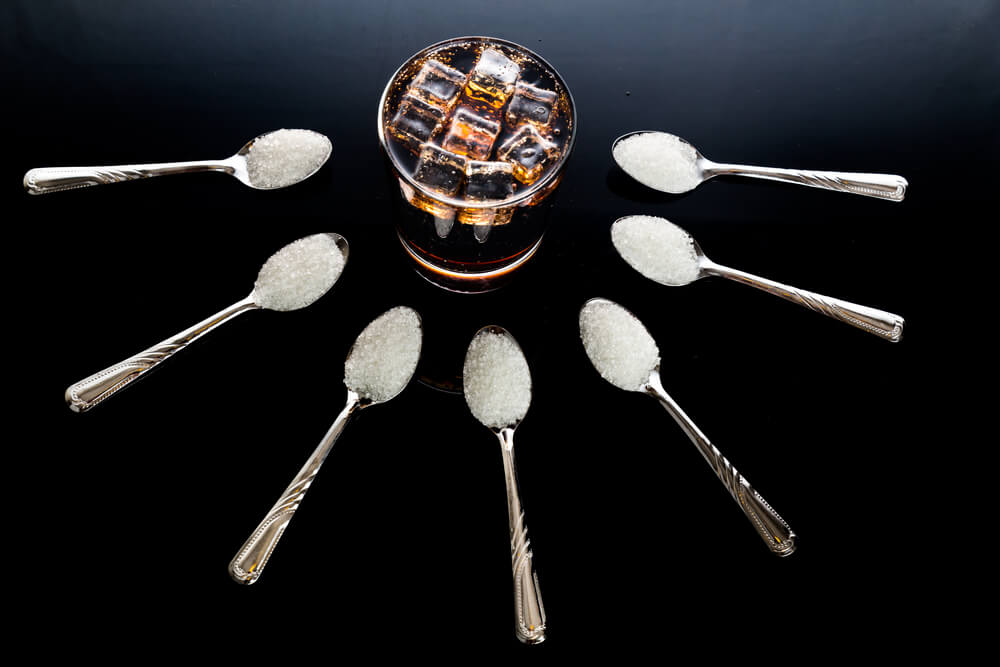Indulging in a refreshing glass of soda has become synonymous with various occasions, ranging from social gatherings to moments of relaxation at home. Nevertheless, cultivating a habit of consuming sugary beverages can lead to enduring health complications in the long run, not to mention its unhealthy!
Whether you’re on Team Coca Cola or Team Pepsi, harbouring a genuine affection for soft drinks, can occasionally border on addiction, if you indulge in ever so often.
Carbonated beverages, also known as soft drinks, are any drink featuring carbonated water, augmented with added sugar or alternative sweeteners such as high-fructose corn syrup and flavoured with natural or artificial additives. Despite its widespread appeal, soda’s adverse effects on health, such as obesity, dental issues and various chronic diseases, are well-documented.
If you’re looking to curtail your soda consumption, particularly if reaching for a can has become a daily ritual, this guide offers strategies to cease its regular consumption.
Why do you crave soda?
Breaking your habit of excessive soda consumption goes beyond sheer willpower, as there are biochemical factors in play, influencing your craving for high-sugar foods and beverages. Within the human brain lies the reward system, designed to reinforce behaviours essential for survival, such as eating. When you consume food, your brain releases dopamine, a neurotransmitter associated with pleasure. Your brain interprets this dopamine release as a pleasurable experience, encouraging you to seek actions, like eating that trigger such releases.
The challenge with soda and other high-sugar foods lies in their ability to induce a significantly greater dopamine release compared to whole foods, resulting in intensified cravings. This sets off a troubling cycle wherein the brain continually seeks more high-sugar foods to attain the same pleasure response, creating a persistent and challenging pattern to break.
Reasons to stop drinking soda —
- Weight gain- High in calories and lacking in satiety, soda facilitates the consumption of a significant calorie load. Studies consistently reveal that regular soda drinkers tend to have a higher body weight compared to non-consumers.
- Linked to chronic diseases- Numerous studies have established a correlation between frequent soda consumption and an elevated risk of chronic conditions, including type 2 diabetes, heart disease and even cancer.
- May contribute to liver disease- Rich in fructose, a liver-metabolised sugar, soda, when consumed excessively, can overwhelm the liver, converting fructose into fat and potentially contributing to chronic liver disorders.
- Decaying of teeth- Soda, containing acids such as phosphoric acid and carbonic acid, creates an acidic oral environment, fostering tooth decay. This effect is exacerbated when combined with sugar.
- Acne- Research indicates that regular consumption of soda or added sugar heightens the risk of developing moderate to severe acne.
- Promotes skin ageing- Some studies suggest that individuals who frequently consume soda or added sugar are more susceptible to wrinkles and other signs of ageing.
- Can decrease energy levels- High in sugar content, soda can lead to rapid spikes in blood sugar levels, followed by abrupt drops, commonly referred to as crashes. Consistent soda consumption can result in energy level fluctuations.
- Has no nutritional value- Devoid of essential vitamins, minerals, fibre, or nutrients, soda merely adds surplus calories and added sugar to your diet without providing any nutritional benefits.
Is diet soda a better option?
Opting for diet soda might appear to be a straightforward solution to transitioning away from consuming regular soda. Instead of being sweetened with sugar, diet sodas utilise artificial sweeteners like aspartame, saccharin, sucralose, neotame, or acesulfame-K. While diet sodas boast low sugar content, they come with several drawbacks. They typically lack nutritional value and still contain various acids that can adversely affect your dental and overall health. Moreover, ongoing research presents conflicting findings regarding the potential links between diet soda consumption and conditions such as kidney disease, type 2 diabetes and heart disease. If you are considering replacing regular soda with diet soda for health reasons, exploring alternative options like sparkling water, herbal teas and other choices may offer more beneficial alternatives.
How to stop drinking soda —
Resisting the allure of soda can be hard, especially when you are cognizant of its adverse effects on your health. However, there are various measures you can implement to reduce your soda intake and reclaim your well-being. The following strategies outline steps to assist you in breaking the habit of drinking soda.
Drink more water
Introducing your new companion: water. When your desire for soda strikes, satisfy it with water. Though not an identical substitute, over time, water will be what you crave and not soda. Oftentimes, soda cravings are mistaken for thirst. When the inclination for soda arises, consider consuming a substantial glass of water initially and allowing a few minutes to pass. You might find the craving diminishes once your thirst is appeased. Water not only effectively quenches your thirst but also aids in maintaining proper hydration.
Avoid getting hungry- it increases your craving for soda
Cravings, including those for soda, often stem from hunger. Therefore, managing your hunger is crucial in addressing your soda cravings. To stave off hunger, maintain a regular eating schedule throughout the day and keep nutritious snacks readily available for moments of potential hunger. Planning your meals in advance can also prevent situations where hunger may arise unexpectedly. By keeping your body constantly nourished, the likelihood of succumbing to your soda cravings diminishes.
Wean off – Don’t go cold turkey
Gradually reducing your soda intake is advised to mitigate potential side effects associated with quitting abruptly, such as headaches and lethargy. A phased approach involves starting with one soda per day, then progressively extending intervals until you are able to go soda-free.
If you prefer a swift change, setting a designated quit date and mentally preparing yourself for that can enhance success rate. Additionally, reducing your soda intake by 1 or 2 ounces per day and considering water as an alternative or adding ice to your soda to diminish the sugar and calorie intake are gradual strategies for lasting behavioural changes. For most people it is important to avoid drastic shifts (like quitting soda cold turkey) and weaning yourself off it for sustainability.
Avoid using soda to quench your thirst
You might grab a soda when you’re thirsty, but it’s essential to be aware that soda can contribute to dehydration. This is because soda contains caffeine, a diuretic that can lead to a decrease in your body’s fluid retention. Typically, consuming soda, especially when you’re already thirsty or in excessive amounts, can exacerbate dehydration. Opt for a glass of water or whole juice as a better alternative to soda.
Opt for a healthy sweet treat instead of soda
Cravings for sugar are widespread and when you feel a strong desire to drink soda, consider satisfying it with a healthier sweet substitute. Opt for nutritious alternatives such as fruits like apples, berries, pineapple, mangoes and grapes or sugar-free chewing gum or yogurt paired with a few small pieces of fruit. However, be cautious about substituting soda with fruit juices. While fruit juices offer more nutrients than soda and might seem healthy, they are often high in sugar, so it’s best to limit their consumption as well.
Distance yourself from soda- don’t buy it
When you sense a craving for soda emerging, make an effort to detach yourself from the thought. Engaging in activities like taking a walk or going for a shower can redirect your mind and surroundings, potentially putting an end to the craving. Additionally, eliminate soda from your household by not buying it or keep it out of easily accessible areas to reduce temptation. By making it unavailable, you’ll be compelled to seek alternatives or live without this sugary beverage.
Try to manage your stress levels
Frequently occurring stress can trigger food cravings, particularly in women. Numerous studies indicate that individuals experiencing stress are inclined to consume more calories and experience heightened cravings compared to those who are not stressed. Various stress-relief methods, such as regular exercise, meditation, yoga, deep breathing and mindfulness, have been shown to be effective. Stress has been linked to an increased likelihood of turning to sugary drinks. Resorting to sugary treats as a way of coping with stress and succumbing to their cravings can be very unhealthy in the long run. It is beneficial to manage your stress.
Set achievable goals
If you aim to cut down on your soda consumption, consider gradually reducing or limiting your intake over time. Establishing weekly goals to progressively decrease your soda intake can be an effective approach. While quitting abruptly may work for some, setting realistic and achievable goals is more likely to help you develop sustainable, healthy habits.
Create a support system
A lot of us consume soda during social gatherings. If you are trying to cut back on your intake, try to inform the people around you. This way, they can offer support, keeping you accountable and helping you in staying on course.
Try a soda alternative —
Occasionally, the most effective approach to suppress a craving is to exchange it with a similar alternative. If your penchant for soda is rooted in habit, consider finding a substitute for your daily soda fix. For example, if carbonation is your preference, seltzer water presents a viable soda alternative. Here are some soda alternatives-
- Infused water or sparkling water- Add slices of fruits, cucumber or mint into sparkling water for a delightful soda substitute.
- Sparkling green tea: Sparkling green tea is low in sugar, gives you the carbonation of soda along with the advantages of green tea.
- Herbal or fruit teas: These beverages not only lack calories but may also offer potential health advantages.
- Kombucha: A delightful probiotic tea associated with many health benefits akin to traditional tea.
- Coconut water: While not calorie-free, this natural beverage stands as a much healthier option compared to sugary sodas.
Don’t give up even if you give in —
Eliminating soda from your diet extends beyond mere willpower. Don’t give up on your attempt to ditch soda. There will be times you crave it and it is okay to enjoy a glass once in a while. Don’t dwell on the fact that you strayed away from your no soda resolution. Sometimes, giving into your whims is acceptable.
Enjoy it, acknowledge it and move on!




